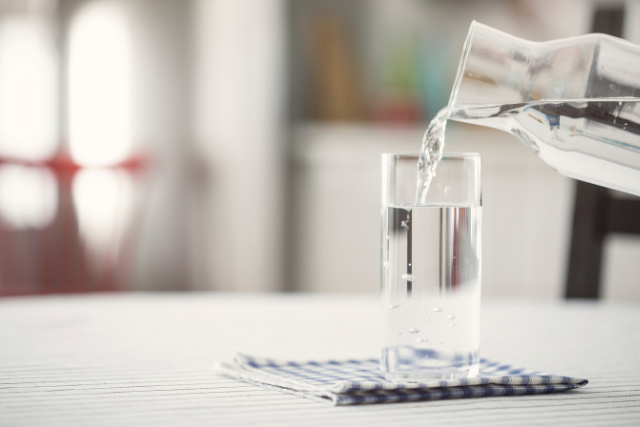How to Choose a Tap Water Filter For Clean Drinking Water at Home
Learn how to find a tap water filter that works best for your home and life situation – including the four most important questions to ask before you buy.

Aquasana provided me with free product, but all opinions are my own.
When you turn on the tap in your home, and you look at the clear stream of water coming out, I bet that toxic chemicals are not the first thing that comes to mind. I mean, it’s water, right? Pure and clean and ready to drink. Right??
But surprisingly, even in a highly developed country like the United States, our water supply is not as clean as you would think.
I may receive commissions from purchases made through links in this article including Amazon Affiliates. Full Disclosure
Why a Tap Water Filter is Important
Yes, our water supply is regulated by the EPA (Environmental Protection Agency). But federal drinking water standards have not been updated in almost 20 years, even though new contaminants have made their way into the water supply. Plus, EPA regulations do not adequately take into consideration the needs of vulnerable populations like babies, kids and pregnant women.
Fortunately, the non-profit advocacy group, EWG (Environmental Working Group), took matters into their own hands and created a tap water database, based on truly safe standards for contaminants in drinking water. EWG’s Tap Water Database collects data from nearly 50,000 local utilities in 50 states and evaluates it for industrial and agricultural contaminants.
The EWG database has found hundreds of contaminants in drinking water, many at levels that pose health risks including cancer, brain damage, nervous system problems, fertility problems or hormone disruption.
It’s maddening! But that’s enough depressing news – let’s move on to the solutions!
One thing you can do is support organizations that advocate for clean water, like the EWG or Clean Water Action. The other thing you should do is buy a tap water filter, to make sure your drinking water is clean and healthy at all times.

Questions to Ask When Choosing a Tap Water Filter
The world of tap water filters can be pretty confusing – there are so many types to choose from! So I thought it would be helpful to share a simple process for choosing the tap water filter that will work best for your needs. Here are the top questions to ask when you are shopping for a home water filter:
1.) What Contaminants Does it Filter?
Start by heading over to the EWG Tap Water Database and entering your zip code or clicking on your state. From there, you can see which contaminants have been detected in your water. Use that information to help you determine what to look for in a water filter.
Depending on where you live, your water might be pretty pure (I’m lucky to live in Minneapolis, where our water is quite good!), or it may be very bad – especially if you live near industrial sites or agricultural areas.
Common contaminants that you would want to filter out include: chlorine, heavy metals, PFAS chemicals, and possibly fluoride. Plus many other contaminants with long chemical names that you probably don’t want to memorize.
Tip: Ask for the Performance Data Sheet for a filter to see the full list of contaminants filtered out, before you make a purchase.
2.) What Type of Tap Water Filter is It?
The next question to ask is what type of water filter will work best for your home situation? This depends on how much room you have, how much money you want to spend, and whether you want filtered water for the entire house or just one sink.
Here are the primary types of water filters:
- Countertop pitcher – The simplest and least expensive option, but filters out fewer contaminants.
- Faucet-mounted water filter – An affordable option if you don’t mind a large attachment to your faucet.
- Under sink water filter – Filter unit fits under the sink and is connected to a dedicated faucet (this is what I use!)
- Whole house water filter – A bigger investment that filters water throughout entire house, including bathrooms and laundry.
3.) Does it Have NSF Certification?
A high quality water filter should have NSF (National Sanitation Foundation) certification. This means that the filter has been tested and met the requirements under NSF/ANSI standards.
There are different NSF standards for filtering different types of chemicals. Check the Performance Data Sheet to find out which NSF standards a filter has met.
4.) How Long is the Filter Life?
Before you commit to a water filter, you’ll want to understand how often you will need to change the filters, how easy or hard they are to change, and of course the expense of the filters.
The filters on countertop pitchers are typically cheap and easy to replace but usually have to be changed once per month. An under sink model could have up to 3 filters that need to be changed every 6 months, and might require a tool or two. Filters for a whole house water filtration system last longer, but may require a plumber and are more expensive overall.

Why I Recommend Aquasana Tap Water Filters
Over the years, we have tried a few different filters for our kitchen tap water – both countertop pitchers and under sink filters. We prefer the under sink version because it is out of sight and provides endless filtered water through the dedicated faucet.
Aquasana is the brand I use and recommend. The filter system we currently have is the Aquasana 3-Stage Max Flow. It is an under sink water filter, with 3 separate filtering stages. We chose it because it filters out heavy metals like lead (important because we live in an older home), plus chlorine and many industrial and agricultural chemicals.
What I love most about the 3-Stage Max Flow is the fact that the water has a fast flow rate! Other under sink filters we have used in the past had a very slow flow rate, which was super annoying. Whether I am getting drinking water for myself, water for cooking, or filling up the dog bowl, I want my clean water to come out FAST!
Plus, each 3-Stage Max Flow filter cartridge filters enough water to replace 6,000 single-use plastic water bottles – a huge eco-friendly win because it’s always best to use less plastic! The filters are easy to change and are replaced every 6 months (the Water for Life auto-ship program makes it super easy to keep in stock.)
A few more things to note about Aquasana:
- NSF Certified to reduce 77 common water contaminants including over 96% of chlorine and chloramines as well as over 99% of lead, asbestos, turbidity and VOCs.
- Beneficial minerals such as calcium, magnesium and potassium remain in the water
- Filter components are engineered for minimal waste including reusable outer filter casings
- Once the life of the filter cartridge expires, the plastic portions can be recycled and the carbon can be composted.
- Aquasana’s manufacturing facility in Texas is 100% powered by wind energy, eliminating the need to burn fossil fuels.
Hope that helps – and enjoy your clean drinking water!






